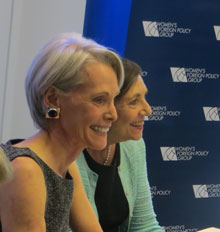Putinism: The World According to Vladimir Putin
Jill Dougherty, Woodrow Wilson International Center for Scholars
Photos | Transcript

Washington, DC—On September 9, 2014, Jill Dougherty, a public policy scholar at the Woodrow Wilson International Center for Scholars, spoke to the WFPG on “Putinism: The World According to Vladimir Putin”. She discussed how Putin’s personal history and professional experience has influenced his leadership style and his foreign policy. The discussion was moderated by WFPG President Patricia Ellis.
Dougherty linked Putin’s behavior to his personal background by sharing stories of the poverty and hardship Putin faced during his childhood in Leningrad, a city that was heavily affected by World War II. In order to protect himself, Putin mastered the art of judo, which gave him a new sense of discipline. He also joined the KGB early in his career, which she said explained the predominance of KGB members in Putin’s inner circle. According to Dougherty, this sense of discipline and calculation still shapes Putin’s foreign policy. She explained that this may be the reason for Putin’s distaste for being cornered by other countries. She cited the crisis in Ukraine as an example of this behavior, and stated that Putin dislikes NATO coming in close proximity to Russia’s borders. She identifies keeping NATO at a distance as one of Putin’s top foreign policy priorities.
Dougherty also discussed Putin’s ideology and the factors that influence it. Putin’s approach is that of a system of “managed democracy” in modern Russia, in which he has central control both politically and economically. She reiterated Putin’s ultimate support for democracy, but also cited that his mistrust for the people leads him to believe they must be led with strict guidance. She also explained the moralistic tone Putin has adopted. Putin portrays the West as socially corrupt by contrasting it with the Russian Orthodox Church, which he venerates as a guiding moralistic institution. Dougherty discussed the impact of these moral crusades, stating that they garner support for Putin both at home and abroad in certain countries in the Middle East and Africa. Dougherty also said that Peter the Great played a significant role in the shaping of Putin’s ideology, and stated that Putin considers him a personal hero because of his success in reforming Russia.
Dougherty also discussed Russian media, soft power, and the use of propaganda. She cited the opening ceremonies of the Sochi Olympics as a recent example of soft power, which underscored the importance of Russian high culture as a critical component of their soft power influence. She also explained how the media is utilized by the Russian government as a channel for soft power. The government’s cozy relationship with media executives allows the government to express its opinion directly to Russian citizens. Dougherty also pointed out that in addition to control of internal media, the government also pours money into external media, which reaches Russian speakers across the globe. This external influence, Dougherty says, is a result of the Russian government’s desire to protect Russian speakers in other countries, such as Ukraine.